A History of St. Andrew`s Church, Charmouth
This is the story of Charmouth`s most infamous Rector. His name was John Audain and his family originated from St. Kitts, in the West Indies. He was to take on the position of Rector of the village in 1783, on the death of William Combe, who had been the Minister for nearly 40 years of this and the neighbouring Parish of Catherston. On his death it was assumed that his son, Brian would become Rector, Although he was to become Parson at Catherston, he only had the position of Curate in Charmouth. The senior role was to go to John Audain, who would have been just 18 at the time and only recently ordained. The Lord of both Manors at the time was Francis Phipps Henvilll, a descendant of Anthony Ellesdon, who lived in St. Kitts. He was also Patron of the Church and no doubt used this position to ensure that his relation became its new Rector. It would seem that although the Reverend John Audain was to appear in the village records in this position for 43 years, most of this time was spent in the West Indies. The work of the Church was to be carried out by three able Curates, Brian Combe (referred to earlier), Joseph Hodges and Thomas Snow. It was not until 1825 that he would lose his position to Rev. William Glover after his long absence. George Roberts in his History of Lyme Regis of 1834,provides an anecdote of his earlier time in Charmouth as follows:
“ He fought a battle at Lyme Regis with an Irish chaise driver, and preached with his usual energy. His preaching carried every one with him: his fighting was good and manly, but not so successful, for the knight of the whip eventually beat him”.
He was to marry Ann Willett, and have a son, John Willett Audain, After a few years he tired of these shores and returned back to the West Indies. H.N. Coleridge in 1825, gave a long account of the exploits of Parson Audain of Roseau. An abbreviated version appears below:
“One of the finest pathetic preachers of his age, according to contemporaries, whose appearance was fine, gentle and venerable, and who supplemented his stipend by owning a small privateer. His schooner was captured, (whilst smuggling negroes to Guadeloupe) by another privateer, from Nevis. The Parson went to Nevis, posted his rivals name on the Courthouse door, and stood on guard there with loaded pistols for three days in the hope that the man would come and challenge him in a duel. He had fought thirteen altogether in his life, and on one occasion, while waiting for the seconds to reload, he went up to his opponent, suggested 'just a little something to fill in time, good sir' - and knocked him flat with his fist.
Meanwhile his wife, Ann, who had more tranquil tastes, lived at Bristol. So he now married a Dutch widow, conducting the ceremony himself. After his scandalous life he was to die in 1825, aged 60 at St. Eustatius, in the West Indies, still serving in absence as Rector of Charmouth.
The Reverend John Audain, whose adventures are told by Henry Nelson Coleridge in his entertaining book “Six Months in the West Indies”, a book, by the way, which would be well worth reviving. Audain, who started life as a midshipman, was appointed to Charmouth in 1783, presumably not long after his ordination. He was pre-eminently a militant parson, and it is recorded that he fought a battle at Lyme with an Irish chaise-driver, who beat him. But then, besides the business in hand, Audain was simultaneously delivering a most eloquent sermon. No doubt he found the combination breathless work. Audain subsequently became rector of Roseau in Dominica. It was there that Coleridge heard of him. I wish I could transcribe his account in full. It is very entertaining, but rather long. I shall, however, quote as much as possible. Audain, a British patriot, though his name suggests a Gaulish ancestry, fitted up a schooner for the purpose of private warfare against the French. " It is even yet fresh in the recollections of the inhabitants of Roseau, with how joyful a rapture this holy Dominican once broke off the service on a Sunday, unable to repress the emotions of his triumph on seeing the vessel of his faith sail into the bay with a dismasted barque laden with sugar, rum, and other Gallic vanities from Martinique." Soon after this the gallant clerk lost his luck. A friend of Coleridge's met him one day at Basseterre in St. Kitt's, " surrounded by negroes, to whom he was distributing plantains, yams, potatoes, and other eatables, and holding private talk with them all by turns. Having caught my friend's eye, he came up to him and said, “I am going to smuggle all these - - rascals this evening to Guadeloupe.” He did so in his schooner, but remained himself on shore. A privateer of Nevis captured the smuggler before she could get to her market. Audain became furious, went himself to Nevis, and challenged the owner of the privateer to fight. The challenge was not accepted, and Audain immediately posted the name of the recusant, as that of a scoundrel, on the wall of the court-house. He himself for two days kept watch upon the platform, with a sword and four pistols stuck in his belt, to see if anyone dared to touch the shields." Undaunted and truculent, Audain fitted out another schooner in which he sailed in person. But on the second day of his voyage he was captured by a Spanish trader (better armed than he had thought), his crew butchered and himself only saved by the miraculous hap that his conqueror was a man whom he had once served. These misfortunes told against him at Roseau. Unless justified by success, smuggling and privateering were deadly sins in a parson. So Audain threw up in French, in the forenoon read the liturgy of the Church of England, in the afternoon sprackened the Dutch service, and at nightfall chanted to the Methodists. Rendered poor by his losses, he listened gladly to the blandishments of a wealthy and massive Dutch widow. To make certain that all was correct, the bridegroom himself performed the ceremony ; but seeing that he already had a wife in England, the irregularity was unimportant. When Coleridge wrote, in 1825, Audain, a man of sixty, was still living at St. Eustatius. But he was a reformed character, and the noise of his praying disturbed his neighbours at night. With his wives he was on excellent terms ; the Dutch wife loving and tending him, the English sending him Christmas presents. Truly, he was a man of parts. He had fought thirteen duels, was a skilled boxer, and, on one occasion at least, combined the two forms of combat. " He was a singularly eloquent preacher in the pathetic and suasory style, and he rarely failed to draw down tears upon the cheeks of most of those who heard him. His manners were fine and gentle, and his appearance even venerable. He was hospitable to the rich and gave alms to the poor."
This Mr. Audain was a patriot, few of his cloth like him ; he was not content with praying against the enemies of his country, he fought against them also. St. Peter certainly owned a boat, and the authorized translation (Mr. Audain loved literal orthodoxy) intimates a partnership amongst some of the apostles in a ship, So Mr. Audain built a schooner, and carried on for many years a system of practical polemics with the disputants of the French school to his own abundant profit and notoriety. It is even yet fresh in the recollections of the inhabitants of Roseau, with how joyful a rapture this holy Dominican once broke off' the service on a Sunday, unable to repress the emotions of his triumph on seeing the vessel of his faith sail into the bay with a dismasted barque laden with sugar, rum and other Gallic vanities from Martinique. It was shortly after this event that the star of Audain began to wax dim. His zeal was equally great, his courage undaunted, but his evil destiny met him at every turn. An acquaintance of mine met him one day in the streets of Basseterre in St. Kitt's surrounded by negros, to whom he was distributing plantains, yams, potatoes and other eatables, and holding private talk with them all by turns. Having caught my friend's eye, he came up to him and said, " I am going to smuggle all these rascals this evening to Guadaloupe." He did so in his schooner,but remained himself on shore. A privateer of Nevis captured the smuggler before she could get to her market. Audain became furious, went himself to Nevis, and challenged the owner of the privateer to fight. The challenge was not accepted, and Audain immediately posted the name of the recusant, as that of a scoundrel, on the wall of the court house. He himself for two days kept watch upon the platform with a sword by his side and four pistols stuck in his belt, to see if any one dared to touch the shields. Audain fitted out another schooner and cruised in her himself. But fate was too heavy for him, though he struggled against it like a man. On the second day a large vessel was seen to leeward; he ascertained her to be a Spanish trader, and, supposing her to be wholly unarmed, bore down on her as upon a certain prey. When he came within pistol shot, fourteen masked ports were opened and as many guns pointed at him through them. Audain was obliged to strike in an instant, and with his carpenter succeeded in secreting himself under some water casks in the hold of his schooner. The Spaniards came on board and cut every man in pieces, except Audain and the carpenter. These two lay all night under the casks, but in the morning, upon further search, their asylum was discovered. They were brought upon deck, and the Spaniards were on the point of hewing them by inches, when their captain exclaimed with rapidity, " Hold all this man's life is sacred, and the other's too for his sake." Audain had formerly done the Spaniard great service at St. Thomas's, and it now saved his own and his carpenter's life. Up to this time, Audain, though occasionally non-resident for the aforesaid reasons, had continued the minister of Roseau. He was a singlarly eloquent preacher in the pathetic and cursory style, and he rarely failed to draw down tears upon the cheeks of most of those who heard him. His manners were fine and gentle, and his appearance even venerable. He was hospitable to the rich and gave alms to the poor. But his repeated losses were such as to bear a royal merchant down, and the Dominicans became more scrupulous, and a governor came who knew not Audain. So Audain abdicated the pulpit of Roseau. Privateering and smuggling had failed; so now he commenced honest trader. He went to St. Domingo with a cargo of corn, sold it well and lived on the island. But his star grew fainter and fainter. He quarrelled with two black general officers, challenged them and shot them both severely. Christophe sent for him, and told him that, if the men recovered, it was well, but that, if either of them died, he would hang him on the tamarind tree before his own door. Audain thought the men would die, and escaped from the tamarind tree by night in an open boat. He now settled in St. Eustatius, put on his black coat again and recommenced clergyman. St. Eustatius is a free port; yet the division of labour has made surprisingly slow advances in it. There were many religions, but no priest, in the island when Audain made his appearance there. He was become liberally minded by misfortune, and he was always actuated by a faith of such immense catholicity that it comprehended within its circle every radiation of opinion from the centre of Christianity, as the felly embraced the spokes of a wheel. Audain offered to minister to all the sects respectively, which the free traders thankfully accepted. In the morning he celebrated mass in French, in the forenoon read the liturgy of the Church of England, in the afternoon sprackened the Dutch service, and at nightfall, chanted to the Methodists. His star descended fainter and fainter though he seemed to be gaining wealth and fame. Audain was a married man, but his wife resided and still resides at Bristol. A Dutch widow, rich, pious and large, cast a widow's eye on Audain; the rigor of Creole viduity softened under the afternoon sprackenings of Audain, as Dutch butter melts under the kisses of Titan, and she told Audain that, if Heaven had made her such a man, she would have married twice. The hint was as broad as herself, but Audain liked it the better for its dimensions, and married her on the spot, sprackening the service himself. Audain has fought thirteen duels,and is a good boxer. Once upon a time, he fired twice without hitting; upon which he threw down the pistol on the ground, and said sternly to his second, " Take care that does not happen again!" supposing his pistol had not been charged with ball. A delay occurred in reloading for the third time, upon which Audain went up to his antagonist, squared his body, and saying, " Something between, something between, good sir !" knocked him down with a flush hit on the nose. Audain is now about sixty years of age,and has wholly reformed his manners. He loves his Dutch wife, and says his prayers so loud at night as to disturb his neighbours. His English wife sends him a Christmas box annually. He is a man of infinite talent, and has seen the world. I trust the report is true, that, like Lazarillo de Tormes and Gines de Pasamonte, he is writing a life of himself. It would be the most entertaining book of this age. If he does not, these few lines may haply serve to rescue him from an oblivion which he does not seem to deserve.
n.b This is like the Cornish vicar. He was preaching one afternoon in a seaside church during a heavy south west gale, when all on a sudden his audience began to move, take down their hats, and press towards the door. The vicar, having the advantage of pulpit eminence and long experience, immediately perceived the cause, and, animated with a just indignation at their conduct, ordered them, as they valued their souls' welfare, to remain quiet till the end of the sermon. The good man in his eagerness to restrain them even left the pulpit, and, like Aaron, ran into the midst of the congregation rebuking and exhorting them, till he reached the porch ; when, tucking up his gown under his arm, he shouted out, " Now, my boys, let us start fair !" and immediately scampered off, with his flock at his heels, to administer Cornish relief to a distressed merchantman. My friend Mr. Oxley in Barbados says he was present at a scene in Tortola, where Audain figured in the manner mentioned in the text; probably it happened twice
From the Reformer 1826
SINGULAR CHARACTER FOR A CLERGYMAN. From Coleridge's Six Months in the W. Indies. The church in Roseau is well situated and tolerably furnished without, but the interior is in a miserable state. The common pitch pine, when unpainted, has a particularly unpleasant effect in a hot climate; it always oppressed me in a remarkable manner. About a hundred persons, chiefly coloured, at tended the morning service; they had few books, and apparently came for the purpose of seeing the bishop; certainly with one or two exceptions, they were entirely unacquainted with the ordinary ritual of the established religion. The church of England indeed does not flourish in Dominica. I believe there are two thousand Protestants in this colony, of which number the Methodists form the larger part; about 16,000 are Papists, under the care of three Spanish priests; so that if true religion thrive not in Dominica, at least its minister does, upon an ample salary, and just so much breathing exercise on Sundays as may conduce to a good digestion for the rest of the week. Not that I would be thought to impeach the zeal of the rector of Roseau; very far from it. Mr. Newman is great and remarkable; but he is not so great and remarkable as his predecessor Mr. Audain. This Mr. Audain was a patriot; few of his cloth like him; he was not content with prayng against the enemies of his country; he fought against them also. St. Peter certainly owned a boat, and the authorized translation (Mr Audain loved literal orthodoxy) intimates a partnership amongst some of the apostles in a ship. So Mr. Audain built a schooner, and carried on for many years a system of practical polemics with the disputants of the French school to his own abundant profit and notoriety. It is even yet fresh in the recollections of the in habitants of Roseau, with how joyful a rapture this holy Dominican once broke off the service on a Sunday, unable to repress the emotions of his triumph on seeing the vessel of his faith sail into the bay with a dismantled barque laden with sugar, rum and other Gallic vanities from Martinique. It was shortly after this event that the star of Audain began to wax dim. His zeal was equally great, and his courage undaunted, but his evil destiny met him at every turn. An acquaintance of mine met him one day in the streets of Bassaterre, in St. Kitts, sur rounded by negroes, to whom he was distributing plantains, yams, potatoes and other eatables, and holding private talk with them all by turns. Having caught my friend’s eye, he came up to him and said, “I am going to smuggle all these rascals this evening to Gaudaloupe.” He did so in his schooner, but remained himself on shore. A privateer of Nevis captured the smuggler before she could get to her market. Audain became furious, went himself to Nevis, and challenged the owner of the privateer to fight. The challenge was not accepted, and Audain immediately posted the name of the recusant, as that of a scoundrel, on the court house. He himself kept watch for two days on the platform, with a sword by his side and four pistols stuck in his belt, to see if any one dared to touch the shields. Audain fitted out another schooner and cruised in her himself. But fate was too heavy for him, though he struggled against it like a man. On the second day a large vessel was seen to lee ward; he ascertained her to be wholly unarmed, bore down upon her as upon a certain prey. When he came within pistol shot, fourteen masked ports were opened and as many guns pointed at him through them. Audain was obliged to strike in an instant, and, with his carpenter, succeeded in secreting him self under the water casks in the hold of his schooner. These two lay all night under the casks, but in the morning, upon further search their asylum was discovered They were brought upon deck, and the Spaniards were on the point of hewing them by inches, when their captain exclaimed with rapidity, “Hold, all! this man’s life is sacred, and the other’s too for his sake.” Audain had formerly done the Spaniard great service at St. Thomas’s and it now saved his own and his carpenter’s life. Up to this time Audain, though occasionally non-resident for the aforesaid reasons, had continued the minister of Roseau. He was a singularly eloquent preacher in the pathetic and suasory style, and he rarely failed to draw down tears upon the cheeks of those who heard him. His manners were fine and gentle, and his appearance even venerable. He was hospitable to the rich and gave alms to the poor. But his repeat ed losses were such as to bear a royal merchant down, and the Dominicans became more scrupulous, and a govern or came who knew not Audain. So Audain abdicated the pulpit of Roseau. Privateering and smuggling had failed; so now he turned honest trader. He went to St. Domingo with a cargo of corn, sold it well and lived on the island. But his star grew fainter and fainter. He quarrelled with two black general officers, challenged them and shot them both severely. Christophe sent for him and told him that, if they recovered, it was well, but if either of them died he would hang him on the tamarind tree before his own door. Audain thought the men would die, and l 16 THE REFORMER. escaped from the tamarind tree by night between, good sir,” knocked him down in an open boat. with a flush hit on the nose. He now settled in St. Eustatius, put Audain is now about sixty years of on his black coat again and recomiage, and has wholly reformed his man menced clergyman. St Eustatia is a ||ners, he loves his Dutch wife, and says free port; yet the division of labour has prayers so loud at night as to disturb made surprisingly slow advances in it. ||his neighbours. His English wife sends There were many religions, but no ||him a Christmas box annually. He is priest in the island when Audain made ||a man of infinite talent, and has seen his appearance there. He was become the world. I trust the report is true, liberally minded by misfortune, and he that, like Lazarillo de Tormes, and was always actuated by a faith of such Gaines de Pasamonte, he is writing a catholicity that it comprehended with-life of himself. It would be the most in its circle every radiation of opinion interesting book of this age. If he from the centre of Christianity, as the does not, these few lines may happily felly embraceth the spokes of a wheel. serve to rescue him from an oblivion Audain offered to minister to all the sects respectively, which the free trades thankfully accepted. In the morning he celebrated mass in French, in the forenoon he read the liturgy of the Church of England, in the afternoon sprackened the Dutch service, and at night fall, chaunted to the Methodists. His star descended proner and proner, though he seemed to be gaining || wealth and fame. Audain was a married man, but his wife resided and still resides at Bristol. A Dutch widow, rich, pious, and large, cast a widow’s eye on Audain; the rigor of creole vi duity softened under the afternoon sprackenings of Audain, and she told him that, if Heaven had made her such a man, she would have married twice. The hint was as broad as herself, but Audain liked it the better for its dimensions, and married her on the spot, sprackening the service himself. Audain has fought thirteen duels,and is a good boxer. Once upon a time, he fired twice without hitting; upon which he threw down the pistol on the ground, and said sternly to his second,—“Take care that does not happen again!” supposing his pistol had not been charged with ball. A delay occurred in reloading for the third time, upon which Audain went up to his antagonist, squared his body, say ing, “Something between, something which he does not seem to deserve. [We learn from the “Metropolitan,” a paper printed at Georgetown, District of Columbia, that this same Mr. Audain was '' in that town and Baltimore in 1807 or iſ 1808. In Georgetown he put up at the Union Hotel, “where,” says the Metropolitan, “he charmed all the boarders with his wit and pleasantry.” The Metropolitan observes further, “We recollect when here that he had twelve very pretty little ivory apostles, which he wished to 'sell; and we believe offered them at the [Catholic] college, but with what success , we never learned.” It is added in the same paper, “Mr. Audain was a regularly admitted minister in that country [England] where church and state mutually stand by each other right or wrong.”
He was preaching one afternoon in a seaside church during a heavy south-west gale, when all on a sudden his audience began to move, take down their hats, and press towards the door. The vicar, having advantage of pulpit eminence and long experience, immediately perceived the cause, and, animated with a just indignation at their conduct, ordered them, as they valued their souls welfare, to remain quiet till the end of the sermon. The good man in his eagerness to restrain them even left the pulpit, and, like Aaron, ran into the midst of the congregation rebuking and exhorting them, reached the porch; when, tucking up his gown under his arm, he shouted out, “Now, my boys, let us start fair!” and immediately scampered off, with his flock at his heels, to administer relief to a distressed merchantman. My friend Mr. Oxley, in Barbadoes, says he was present at a scene in Tortola, where Audain figured in the manner mentioned in the text; probably it happened twice. From the Museum of Modern Literature 1826
Farm land and the town in the front. In the days of early American colonialism it was very thickly populated and immensely rich from trade with the American colonies. Often a hundred or more vessels were in the harbors. its fertile fields produced sugar cane, coffee, cotton and cassava. Rum and sugar were made from sugar cane. Practically all manual labor was Negro slaves. The Heyliger family owned an estate and played an important part in the life of the island.



.jpg)

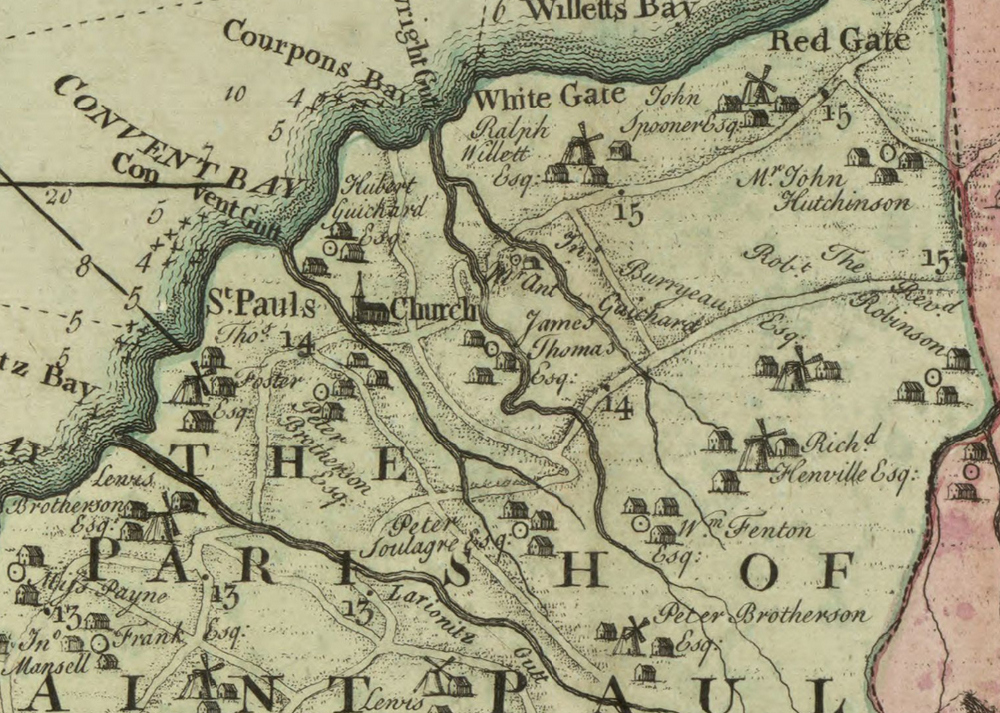

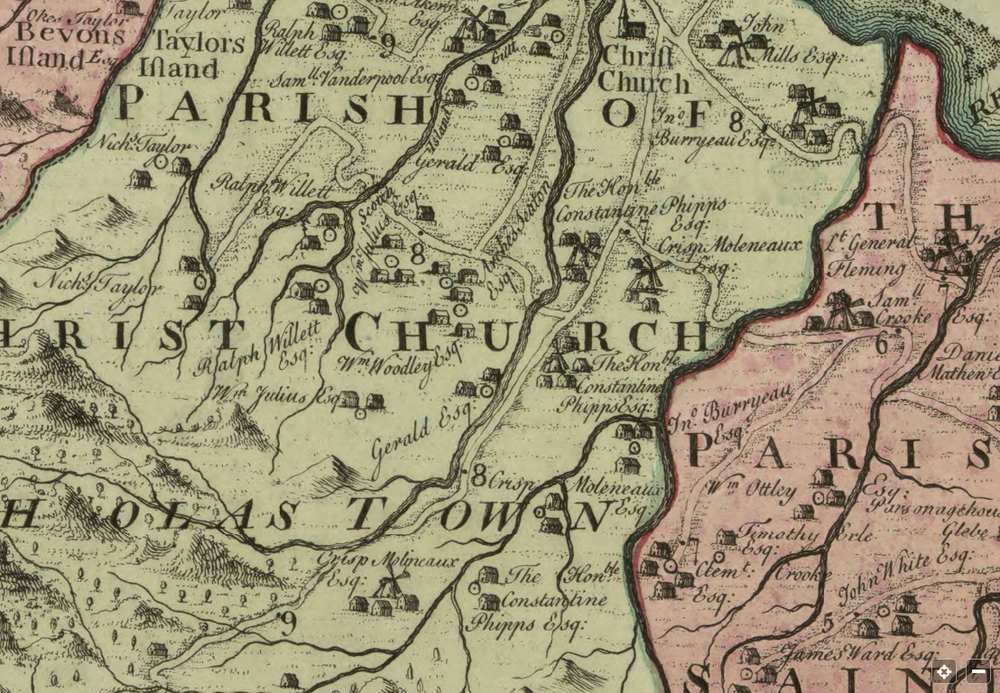
.jpg)

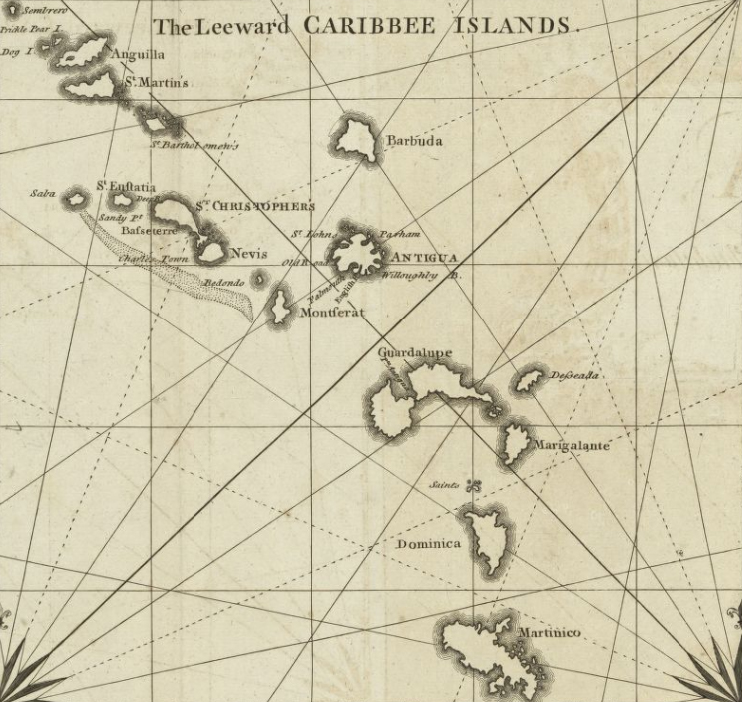
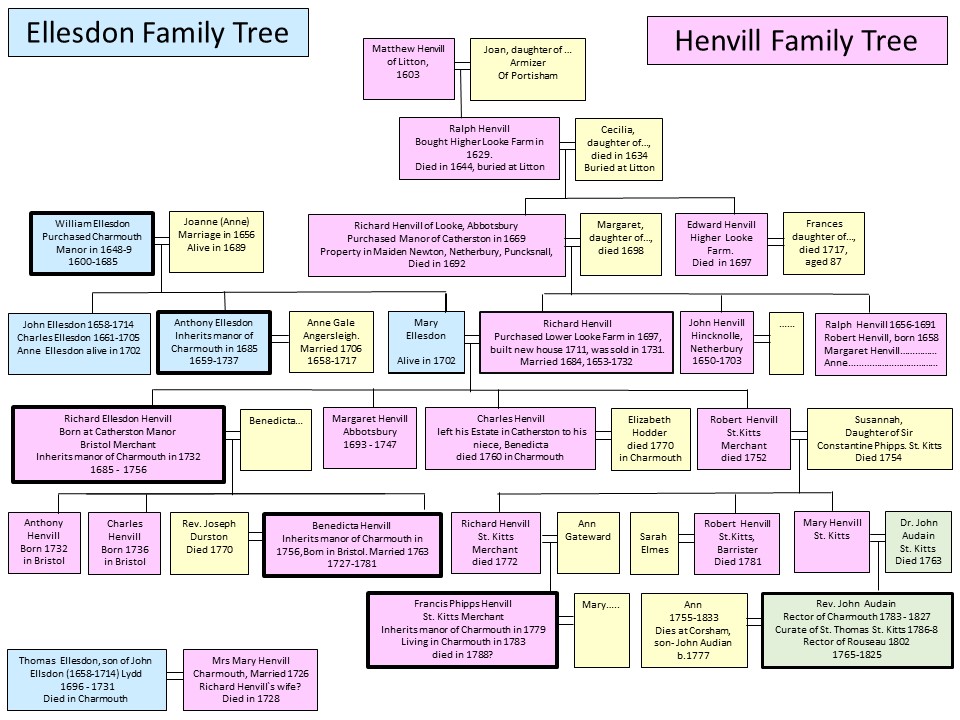
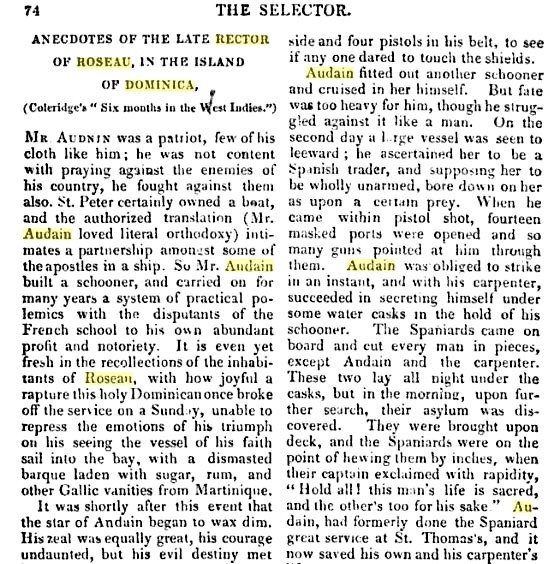
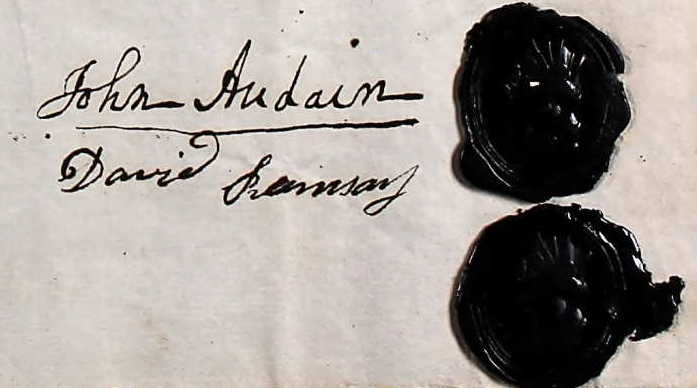

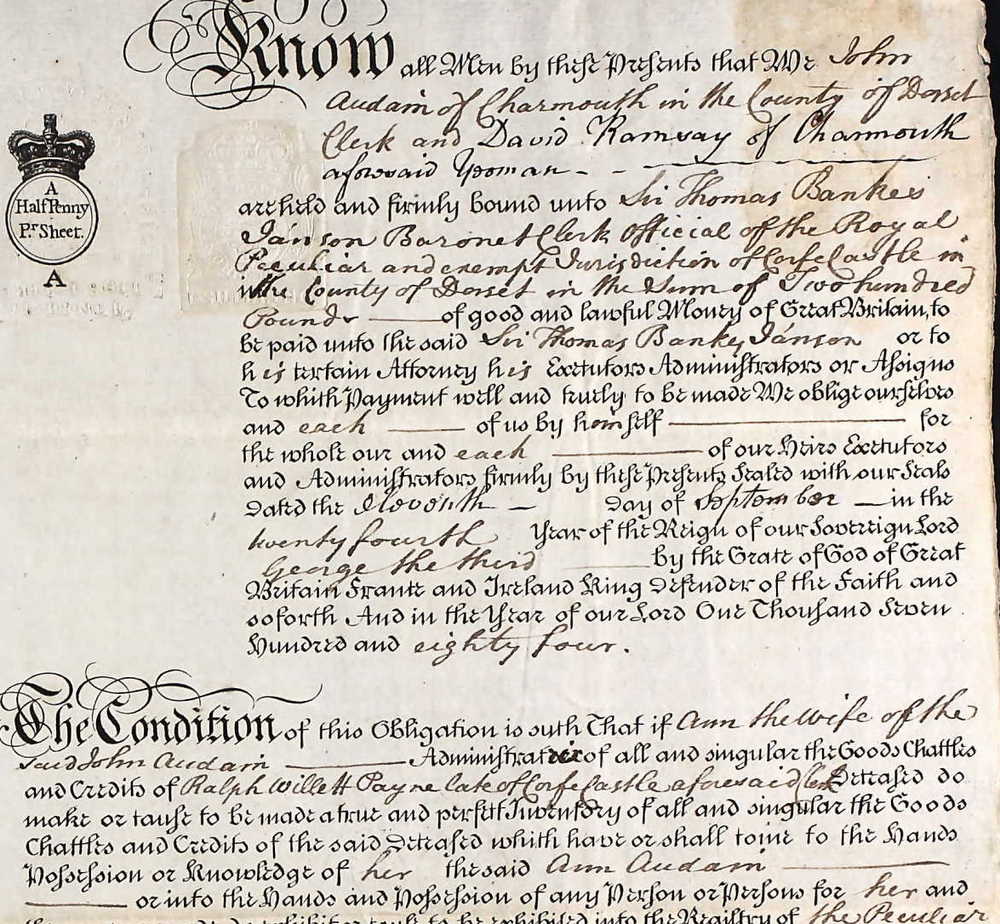
Ralph Willett, a proprietor in St Kitts, bought an estate at Merley (in Canford), Dorset, in 1751 and built a fine house and became sheriff of the county in 1760. In 1795, when it was said to be worth £10,000 p.a., it was inherited by John Adye, the second son of his cousin, who took the name Willett.Slave-owner and connoisseur, whose estates in St Kitts were inherited by his cousin and adopted ward John Willett Adye (q.v., under John Willett Willett senior). Ralph Payne, Baron Lavington (q.v.) was also a beneficiary under Ralph Willett's will, and referred in his own will to the estates transmitted by Ralph Willett's will.
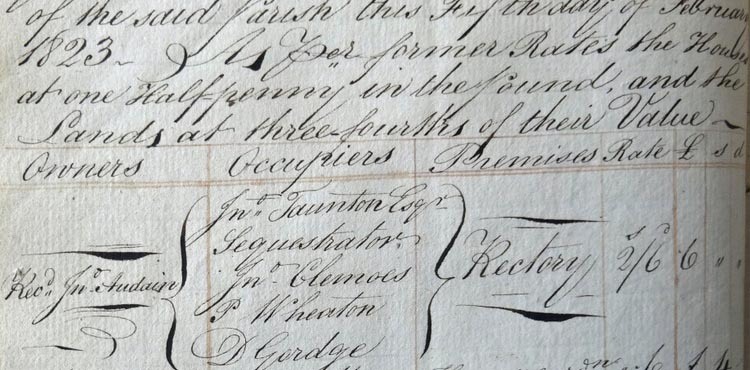
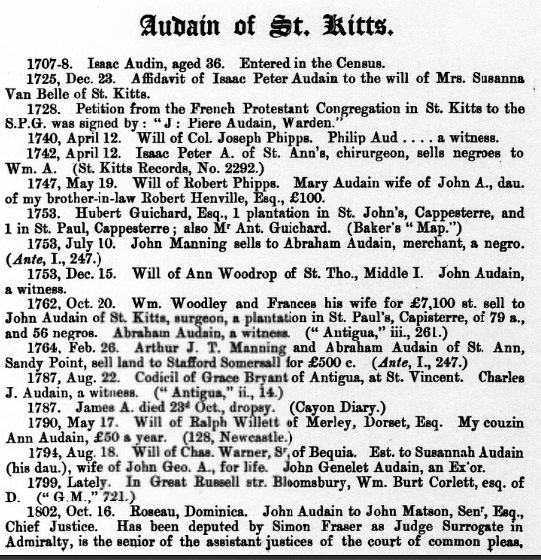
.jpg)
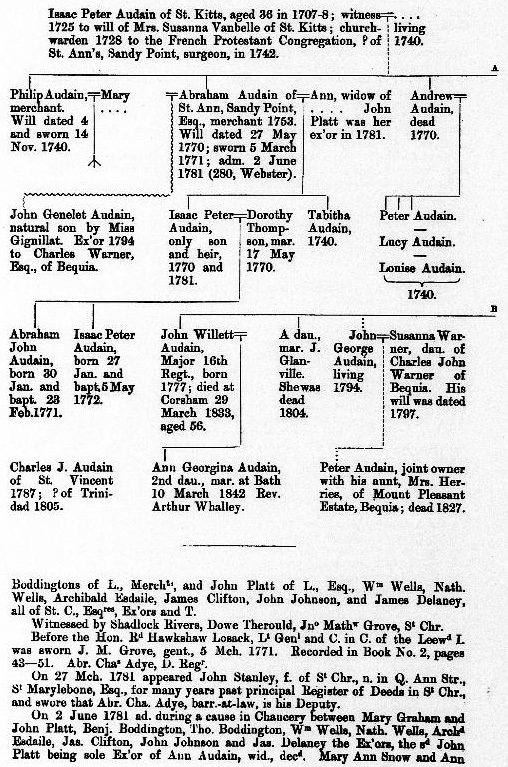
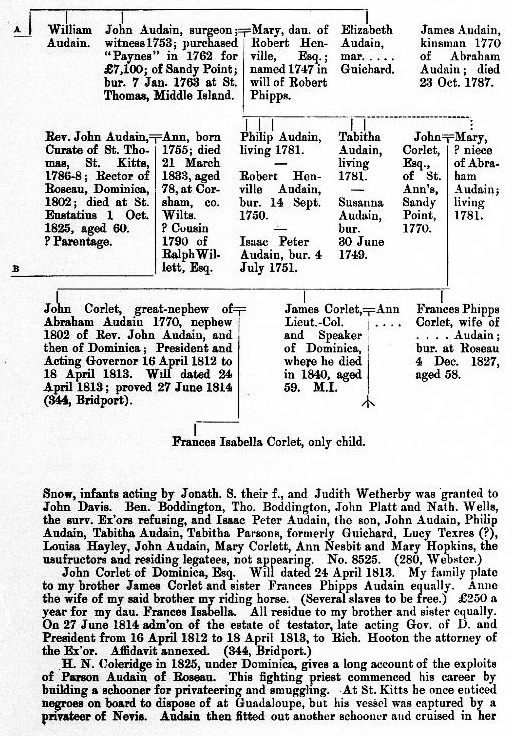
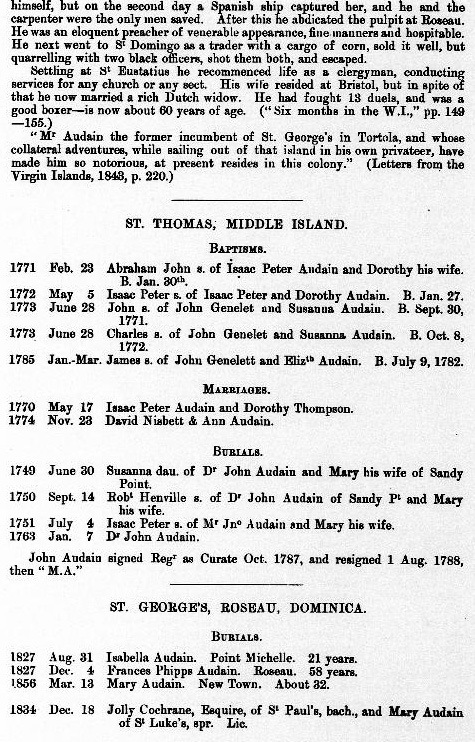
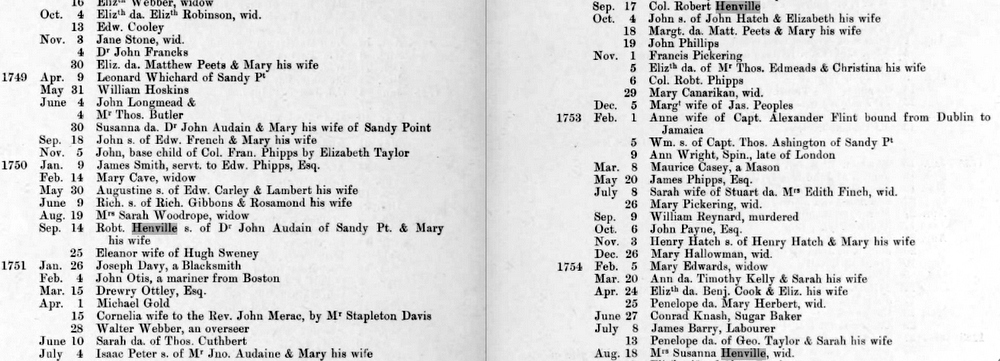

Sandy Point is the second largest town in the island of Saint Kitts . This town is situated on the north-west coast of St.Kitts.It is strongly believed that the area known as Sandy Point was the original landing point for the English sea captain and explorer,Sir Thomas warner, in 1623. After being founded in the 1620s, the town became the commercial centre of St. Kitts and was one of the busiest ports in the region, as evidenced by the remains of the many former Dutch warehouses lining the shoreline, which once totalled over 300.After 1727, when the bulk of commercial activity was moved to Basseterre, the town and its port slowly diminished in importance.

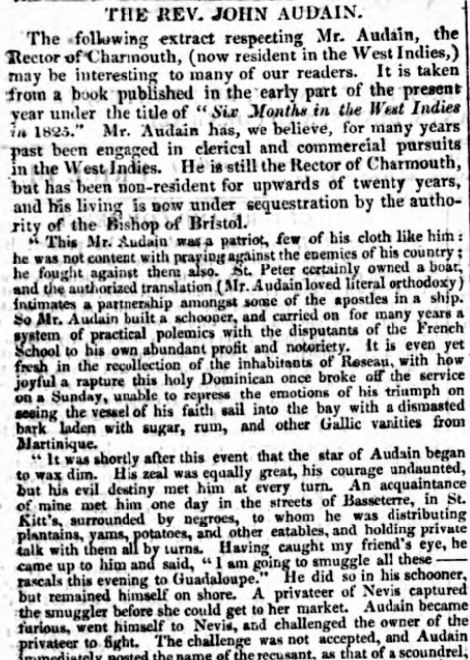
Dorset County Chronicle and Somersetshire Gazette.Noember 8th 1826
The Reverend John Audain.
The following extract respecting Mr. Audain, the Rector of Charmouth, ( now resident in the West Indies) may be interesting to many of our readers. It is taken from a book published in the early part of the present year under the title of “ Six Months in the West Indies in 1825”. Mr. Audain has, we believe, for many years past been engaged in clerical and commercial pursuits in the West Indies. He is still Rector of Charmouth, but has been non resident for upwards of twenty years, and his living is now under sequestration by the authority of the Bishop of Bristol.
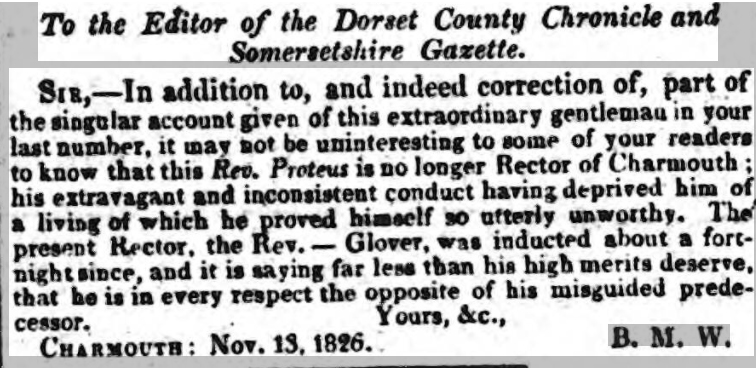
To the Editor of the Dorset County Chronicle and Somersetshire Gazette.
Sir, - In addition to, and indeed correction of, part of the singular account given of this extraordinary gentleman in your last number, it may not be uninteresting to some of your readers to know that this Rev. proteus is no longer Rector of Charmouth, his extravagant and inconsistent conduct having deprived him of a living which he proved himself so utterly unworthy. The present Rector, the Rev. Glover, was inducted about a fortnight since, and it is saying far less than his high merits deserve, that he is in every respect the opposite of his misguided predecessor. Yours, £c., B.M.W. Charmouth November 13,1826
-
Our oldest ancestor on St. Kitts was Dr. Isaac Peter Audain who was recorded in the 1708 census as being aged 36 and having a household of himself, a wife, two boys and one girl. A Huguenot, Dr. Audain originally came to St. Kitts from France in the late 17th. century. He died in 1725 and is buried in the graveyard of St. Ann's Church, Sandy Point. Some day I will get round to publishing my family tree which will contain some colourful characters including Rev. John Audain, the famous Pirate Parson. Today there are Audains living on several Caribbean islands, as well as in the USA, Canada, and the U.K. Most of us are black but there is also a very small group of white Audains still living in France and a few in New Zealand.
Ralph Willett
Profile & Legacies Summary
1719 - 1795
Biography
Slave-owner and connoisseur, whose estates in St Kitts were inherited by his cousin and adopted ward John Willett Adye (q.v., under John Willett Willett senior). Ralph Payne, Baron Lavington (q.v.) was also a beneficiary under Ralph Willett's will, and referred in his own will to the estates transmitted by Ralph Willett's will.
-
Ralph Willett has an entry in the ODNB as 'book-collector and connoisseur.'
-
Ralph Willett, a proprietor in St Kitts, bought an estate at Merley (in Canford), Dorset, in 1751 and built a fine house and became sheriff of the county in 1760. In 1795, when it was said to be worth £10,000 p.a., it was inherited by John Adye, the second son of his cousin, who took the name Willett.
-
Will of Ralph Willett of Morley [in fact Merley] House Great Canford Dorset proved 04/02/1795. In the will he left £1000 and £200 p.a. to his wife as well as £100 for mourning: he also left her three children (surnamed Strutt) £50 each for mourning. Although he died s.p., in his will he provided £8000 to any younger child he had, and £20,000 to a daughter if she were his only surviving child. He left a long series of monetary legacies, typically of £500 (although including individual bequests of: £1000 to his cousin Sir Ralph Payne; £4000 to his cousin John Stanley - of which the £3000 owed to him by Stanley formed part; £1000 to Stanley's son John Willett Stanley; £2000 to Annabella Willett Adye, daughter of his cousin John Willett Adye). He left his two plantations in St Kitts in trust, together with (or possibly including) an estate called Bevons Island, 'late the estate of Samuel Oakes Taylor' for his children, in absence of which to John Willett Adye, son of his [the testator's] cousin Clara Adye, on condition that he changed his name to Willett. Later in the will he specified the addition of the enslaved people, utensils etc. on the estates to the same trust, with remainder to John Willett Adye's son (with provision for £12,000 to his younger sons and daughters). In a codicil he gave his wife the right to his house for life. A long series of further codicils appears to have amounted to no more than tinkering with the original will.
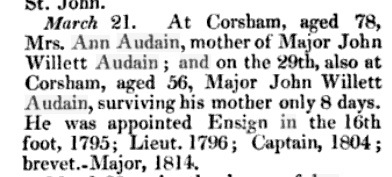
we thought the readers of Henry Coleridge's clever book on the West Indies, might like to hear a few more anecdotes of their old acquaintance, Audain the fighting parson :— “ He commenced his career in life as a mid shipman in the navy; but it is evident that he possessed a soul above the restraint which that office imposed upon him, and he gave up ‘watch and watch,’ and reeling topsails, for a province of action which might better suit his inclinations and his talents. ' ' ' And he therefore exchanged an existence for a living, by appearing on the theatre of life in the character of a parson. The West Indies, of all places in the world, presented an extensive field for the exercise of his sacred calling, but it proved too circumscribed for a mind that knew no bounds; and in order to fill up the hiatus between his occasional avocations in the church, he at length yielded to its craving solicitude after more active and profitable occupation, by embarking in the business of an auctioneer, and the more hazardous speculations attendant upon privateering. '“In the pulpit he was eloquent and persuasive, manifesting all the energy of a devout spirit, in his sale-room he was equally happy in engaging the attention of his hearers, and in all the various details of his privateering exploits, he was no less distinguished for zeal, ability, and courage. He was engaged in the pulpit when the report of a cannon was heard from seaward. From his station, as well as from other parts of the church, a clear view of the harbour was obtained, and a vessel shortly afterwards appeared in the oiling crossing the entrance; another report was presently heard, and the shot which was seen to throw up the water where it lodged in the direction of her course, gave evident token that it proceeded from another vessel that was in chase of her. It is scarce to be supposed, that the attention of the congregation was not more or less diverted from the purposes of devotion. Audain for awhile proceeded in his discourse, occasionally taking parenthetical glances at the vessel, until the appearance of a frigate under a crowd of sail, and nearly be calmed, left no doubt on his mind that she was in pursuit of an enemy. This was quite irresistible; the prospect of a bit of worldly glory at once superseded for a time all other considerations: he dissolved the congregation by quitting the pulpit in haste, and proceeding to the beach, in a few minutes he was on board his privateer, and under weigh to join in the chase. The use of his sweeps, and the aid of a light breeze which prevailed near the land, gave Audain great advantage in the pursuit over the frigate in a calm, and he presently disappeared behind the headland which forms one side of the harbour‘s mouth. Many persons ascended the heights to get a view of the anticipated fight, and the report of firing announced to those in the Road Town, whose speculations were upon tiptoe, that the conflict had begun. Audain was the first to board, and followed by his men, he was master of the prize before the frigate came within hail, and when she approached he was required to repair on board. He was not long in settling the point to his own satisfaction, that something on the score of courtesy, and respect to the national flag, was due from him, although not so ready to yield admission that the frigate had a right of participation in the prize, without having shared in the fight. Upon reaching the quarter-deck, he encountered in Captain B——d, an old shipmate in the days of his nautical minority, and after mutual inquiries, congratulations, retrospections, and so forth, it was arranged that Audain should act as prize master and prize-agent, to have the capture adjudicated in the Admiralty Court of Tortola. The frigate proceeded on her cruise, the prize was ultimately condemned and sold, and the proceeds, ‘ errors and omissions excepted,’ were sufficient—-to pay the expenses. “ Audain's auction-room was in the vicinity of the burial-ground : he had mounted the rostrum, and was expatiating on the merits of each succeeding lot, now and then provoking a laugh from his auditors by a ludicrous suggestion, a double entendre. or quaint witticism, but invariably observing a dignified demeanour the moment he found his rhetoric had failed to induce another bidding, and that his hammer was to pronounce his decision. He had frequently looked at his watch as the sale proceeded, as if marking the progress of time towards another engagement; and as it drew to a close, it was evident, by the rapidity of his movements and the urgency of his demeanour, that he wished it terminated. This was more apparent from the frequency of his directing his attention through a window to some object outside, until at lengh arriving at the last lot, he gave solemn assurance that he could not ‘ dwell ;’ and having pronounced those prophetic words, ‘going, going, going,’ still having his eye askance toward the window, the sound of the hammer seemed to give impetus to his movements, and to declare him gone, for he disappeared in a moment. " The object which had engaged his attention was a passing funeral, and it suddenly brought to his recollection that he had been required to perform the ceremony of burial himself. Mortified at being supplanted in his professional vocation, it was with difficulty he could suppress the workings of his inward man, and his eye followed, and his proceedings kept pace with the procession till it reached the grave: and as the hammer gave emphatic decision to the contest for the last lot, the crowd had assembled round the appointed receptacle for the remains of the deceased. Hither Audain proceeded, and he reached the spot just as his rival commenced the service and uttered the words, ‘ I am the resurrection’—‘ Stand aside,’ said Audain, ‘ I am the resurrection !' and he proceeded with the ceremony, with the utmost composure, whilst the assembled crowd gaped wild astonishment."
The Atheneum, saturday April 19, 1834.jpg)
Haviland Le Mesurier of Guernsey and Rev. John Audain V George Barrington, Pickpocket
Before said Barrington’s hand was uplifted their informant heard a purse with money drop on the floor of the lobby at which instant the said Le Mesurier as well as the informant seized hold of said Barrington and secured him and afterwards delivered him unto the custody of Richard Blandy, Constable of the said theatre. That this informant and others repeatedly asked said Barrington what his name was but which he refused to give saying “Gentlemen don’t expose me” and this informant further says that he is firmly persuaded and satisfied that the said George Barrington feloniously stole the said Mr. Le Mesurier`s Purse and Money aforesaid.
Signed Haviland Le Mesurier and John Audain sworn before me this 20th day of January 1787. Old Bailey Sessions, London
Having served part of this sentence, he appealed for remission claiming that it was too severe and had made him extremely ill. This was granted in April 1782 on condition that he exiled himself from England for life. He was subsequently detected in his normal activities in Ireland and Scotland, and in December 1782 was apprehended in London for a theft in Drury Lane Theatre. He was brought before the court at the Old Bailey for contravening the terms of his pardon. In another inventive speech, he stated that he did not realise his exile was for life and that he was now so ill he could not go back to the hulks. He was sent to Newgate Prison to complete his original five year sentence.
Nonetheless, a year later, in February 1784, Barrington again appeared before the Old Bailey for pickpocketing a silk purse and a considerable sum of money in Covent Garden Opera tea room. This was followed by appearances in February 1785, charged with grand larceny of a watch, chain and seals in Drury Lane Theatre, and in December 1789, for pickpocketing a purse and a great deal of money in the same location. In all these cases he was found not guilty, either from want of identification, lack of direct evidence, or as a result of a lengthy delay resulting in key witnesses becoming unavailable. He was also represented by well-known counsel, who successfully challenged the jury, and set the scene for Barrington to perfect his increasingly sophisticated court-room speech-making.

18. GEORGE BARRINGTON was indicted for feloniously stealing, on the 19th of January, in the 29th year of his present Majesty's reign , at the parish of St. Martin in the Fields, a silk purse, value 2 d. and twenty-three guineas, value 24 l. 3 s. and one half-guinea, value 10 s. 6 d. the property of Havilard Le Mesurier , Esq . privily from his person . 9th December 1789
ou are first to determine whether he took the money of the prosecutor from his person; and next whether he did it privily and without his knowledge. Gentlemen, this indictment has been preferred so long as two years and a half ago, as you have already heard; and had it been tried soon after the indictment was preferred, I should have had to produce to you a witness that you would have thought very material; I state this, because I think it is incumbent on the prosecutor in every case to remove all doubt, and to produce every person to the Jury, that in his apprehension can assist in such removal. Gentlemen, the person I allude to is Mr. Adeane, who you will find would certainly have been that material witness; that gentleman has an estate in the West Indies, he has been called and has remained there for two years; therefore it would have been impossible to have had the trial put off on his account; it would have been improper, and the Court would not have suffered it: Gentlemen the circumstancesof the case are these: The prosecutor was at Drury-lane play-house , the day mentioned in the indictment, the 29th day of January; after the play was over he wished to pass through the lobby, and recollecting his property, he kept his hand on the outside of his pocket, for he had in his pocket a purse with twenty-three guineas and a half, and a valuable watch; in the course of going through the crowd, he felt that purse go, and he caught a hand actually at his pocket; he actually seized a person to whom that hand belonged, which proved to be the prisoner: immediately this Mr. Adeane sprang forward and seized the prisoner, exclaiming, Sir, you are right, I saw him do it; another person picked up the prosecutor's purse and gave it to him; we have never heard of that person: Gentlemen, with a great deal of difficulty (whether from the crowd or from any preconcerted scheme in protecting the prisoner I know not, however with great difficulty) he was secured and carried to Bow-street, and there delivered into the custody of a constable, and the prosecutor was desired to attend at Bow-street the next day; he did attend, but the prisoner was not there; he had escaped.I went along, pressing through the crowd to get to my servants, I felt my purse move, and on feeling my purse move, I immediately got my hand up in this manner, with my right hand, and with my left I turned round to seize the person whose hand I had, and I seized the prisoner's hand close to my pocket, and with the other hand I turned round and I seized his person; I did not say any thing to the prisoner, my aim and wish was to recover my purse, which I thought was in his hand; I had not time to seize upon him, for a Gentleman, a Clergyman, whom I have since found to be Mr. Adean, stept up and said, sir, you are right, I saw him do it.
Was there any other person at the time it was done so near you, that you thought it could be done by any other person but him? There were people all round: on Mr. Adean's stepping up to me, on my having his hand up still, a Gentleman from the other side called out, sir, here is your purse; and delivered me my purse.That was while you had hold of the prisoner's hand? - instantly after Mr. Adean had seized him.
From a book in the possession of Mr Wilkinson and bound in Vellum with the word CHARMOUTH on the Cover opposite the title page in very much faded words : the original is in the hands of Mr. Puddicombe of Branscombe.
Index to the map of Charmouth Manor and Newlands Farm in the Parish of Whitchurch Canonicorum in the County of Dorset.The property of Francis Phipps Henvill Esq. By James Upjohn of Shaftesbury 1783
A true copy of the original as examined by us on the 5 th day of September 1813 signed W.Comins, R.George Tuckett, clerks to… of Honiton
Unfortunately this map has been lost.
The inventory, besides the names & quantities of the fields, records also the value per acre, value per annum, number of trees and values of trees. These have been omitted in making this copy and only totals recorded.
13th November 1783 Attested copy of Indenture between said parties whereby said Francis Phipps Henvill charged said premises with the further sum of £300 and lawful interest making together the sum of £1500.
15th November 1783 Attested Copy of Bargain and sale involved in the Court of Common Pleas at Westminster between said Francis Phipps Henvill and Mary his wife of the one part and Baruch Fox the elder of Beaminster in the County of Dorset, gentleman and John James Millard of the City of Bristol, Cooper with of the other part whereby said Francis Phipps Henvill granted and conveyed said Manor, Heridiaments and premises to said Fox and Maitland and their heirs interest for sale .
3rd June 1788 Attested Copy of Indenture of Release being of 5 parts made between said James Ireland and William Blake Surviving Trustees named in the last will and Testament of the said James Hoskins, deceased of the first part said Baruch Fox and John James Millard of the second part, William Durston of Mark in Somerset, gentleman the residuary devises of the last Will and Testament of Benedicta Durston, late of Charmouth, widow, deceased of the third part the said James Warden of the fourth part and John Harvey Pearce of the fifth part whereby the said James Ireland and William Blake Baruth Ffox John James Millard and William Durston. Granted and conveyed said Manor and premises to said James Warden and John Harvey Pearse and the heirs and assigns of the said James Warden forever and as to the Estate of the said John Harvey Pearse Interest for said James Warden, his heirs and Assigns.
.... 1788 Indenture.. And release between said James Warden and John Harvey Pearce of the one part and said Brian Combe of the other part whereby said John Harvey Pearce at the request and by the direction of the said James Warden did alienate and confirm and said James Warden did grant and confirm the said premises before particularly mentioned and hereby conveyed with their appurtenances unto the use of the said Brian Combe, his heirs and assigns forever.
.jpg)
The horrors of the Negro slavery existing in our West Indian ..., Volume 4
1805
The Clerical Guide, Or, Ecclesiastical Directory: Containing a Complete ..1829.
They emigrated to the island of St. Kitts, West Indies in the Caribbean Sea, where they established sugar plantations.
In St. Kitts, John Audain, a descendent, married Ann, the daughter of Lord Mulgrave. More commonly known as the "Pirate Parson",[7] John Audain's numerous exploits around the Caribbean have been well documented.[6]
John Audain's grandson, Colonel John Willett Payne Audain, lived in Belfast, Northern Ireland, while his great grandson, Colonel Guy Mortimer Audain, followed in his father's footsteps into the Indian Army.
The Audain`s until the revocation of the Edict of Nantes, at which period, having embraced the new religious opinions of the Huguenots, they were forced to quit France, emigrating to the West Indies, where they purchased large sugar plantations. John Audain married while there the daughter of Lord Mulgrave, afterwards Earl of Normandy, and his son, who was married to a Miss Payne, heiress-at- law to Lord Lavington, was educated at Winchester by his uncle, Colonel Phipps, the intimate companion of the then Prince of Wales, afterwards George IV. He was distinguished successively as a soldier, a sailor, and a large landowner in the West Indies, a mining capitalist in South America, a churchman, and eminent popular preacher in Bath, and president of the Republic of San Domingo or Haiti. This remarkable man, who could fight, write, preach, bargain and sell, or legislate, with equal facility, and could deliver an extempore address, or harangue a mob in several different languages, signalized himself by the exhibition of indomitable heroism, great fertility of resources, and military and strategic talent in numerous encounters with the Spanish and French expeditions against the West Indian Islands, voluntarily placing his privateering vessels and the tenants on his estates, in the hour of danger, at the service of the English Government. At the siege of St. Kitts, by a French fleet, he organized and headed the defence in person, and defeated the Marquis of Bouille, who was so charmed with his gallantry and military skill that, afterwards learning he was of French extraction, offered him a high command in the army, and the restoration of his family property in Normandy, which had been forfeited to the French Government, if he would join the French, and that if he refused, his government contemplated converting the chateaux and estates into a model-farm. The offer to betray the country of his asylum, his adoption, and his inclinations, was rejected with scorn by the gallant emigre', who, some years afterwards, in accordance with the spirit of the lax and stirring age in which he lived, although at the time in holy orders, he headed the defence of the Island of Dominica, which was besieged by the French, and ably kept the enemy at bay until an English squadron came to the rescue. The published memoirs of this distinguished man, who, at different times, made and dissipated several fortunes (and of which Coleridge's "Six Months in the West Indies" is, in great part, a reprint), teemed with hairbreadth escapes and anecdotes of eccentricity ; and several novelists, including Sir Walter Scott, have been indebted for some of the most trenchant episodes in their works to the facts and realities of his life. His grandson, Colonel Willett Payne Audain, at present residing at Fitzroy- avenue, Belfast, is the surviving representative of this historic family. He has in his possession several valuable memoirs, besides a rare collection of antique sculpture of great value, which his grandfather, the Rev. Dr. John Audain, purchased from one of Napoleon's generals, who had taken it out of the pope's palace at Rome.
.jpg)
.jpg)
RALPH PAYNE, BARON LAVINGTON (1739-1807)
Ralph Payne was born in Basseterre, St. Kitts, in 1739, the surviving son of Ralph Payne (d. 1763), chief justice of St. Kitts, and his first wife Alice Carlisle, the only surviving child and heiress of the Antiguan planter Francis Carlisle.
Like many of the West Indian elite, Payne divided his time between England, especially London, and the Caribbean plantations from which he derived his wealth and power. Educated at Christ's Hospital, Payne returned to Antigua in 1759, where he was promptly elected to the House of Assembly and unanimously voted Speaker of the House.
Payne returned to England in 1762 and embarked on a lengthy and expensive Grand Tour of Europe. In 1767 he married Françoise Lambertina Kölbel, daughter of Henry, Baron Kölbel of Saxony; she was a close friend of Queen Charlotte. Shortly after his marriage, Payne entered English politics, and was M.P. for Shaftesbury from 1768 until 1771, when he was made Knight of the Order of the Bath and set sail for Antigua as the newly-appointed Governor-General of the Leeward Islands.
Payne was popular with the plantation owners. He supported Lord North's government in its struggles with the North American colonists, reporting in 1774 that his islands were free of "mischievous sparks of the Continental flame." He was the first governor in over fifty years to visit every one of the Leeward Islands, after the "Great Hurricane" of 1772. (At the time, the colony consisted of Antigua, Barbuda, the British Virgin Islands, Montserrat, St. Christopher's (St. Kitts), Nevis, Anguilla and Dominica.) He also patronized the artist Thomas Hearne. In 1775, the Paynes left for England "to reestablish Lady Payne's health," and the Assembly petitioned for his speedy return and presented him with a diamond-encrusted sword as a token of their affection. Payne was to remain in England for the next twenty-four years.
He spent many years in various elective and appointive offices, becoming a supporter of Fox after 1780. Payne and his wife also became known for their elaborate parties, despite the rumored unhappiness of their marriage. In 1788 he traveled again on the Continent, and conducted secret but unsuccessful negotiations with Charlotte, Duchess of Albany over the possible return of the Stuart crown jewels to England.
Payne, whose wealth was declining rapidly due to his lavish spending and to the sharp decline of sugar profits after the American Revolution, seceded from the Whig Club and allied with William Pitt and Henry Dundas. In fact, the dinner at which Dundas and Lord Loughborough first broached the idea of an alliance between Pitt and the Duke of Portland was held at his Grafton Street house. His reward for changing parties followed quickly; he was created Baron Lavington of Lavington in the Irish peerage in October 1795.
In 1799 he was re-appointed Governor-General of the Leeward Islands, and arrived in Antigua in August, 1801. He moved into the just-completed Government House, and remained on that island until his death in August, 1807. Payne was buried on Carlisles, his Antigua plantation. His estate was thoroughly encumbered by debts, mortgages, and liferents, and his widow was left so poor that the Antiguan assembly voted her a pension of L 300 a year "in affection and esteem." She returned soon after to England, and died at Hampton Court Palace in 1830. See "Payne, Ralph, Baron Lavington" in the Oxford Dictionary of National Biography (Oxford, 2004) for further information.
| Repository: | Beinecke Rare Book and Manuscript Library
P.O. Box 208330 New Haven, CT 06520-8330 Email: beinecke.library@yale.edu Phone: (203) 432-2972 Fax: (203) 432-4047 |
| Call Number: | OSB MSS 138 |
| Creator: | Lavington, Ralph Payne, Baron, 1738-1807. |
| Title: | Ralph Payne, Baron Lavington family papers |
| Dates: | 1679-1855 |
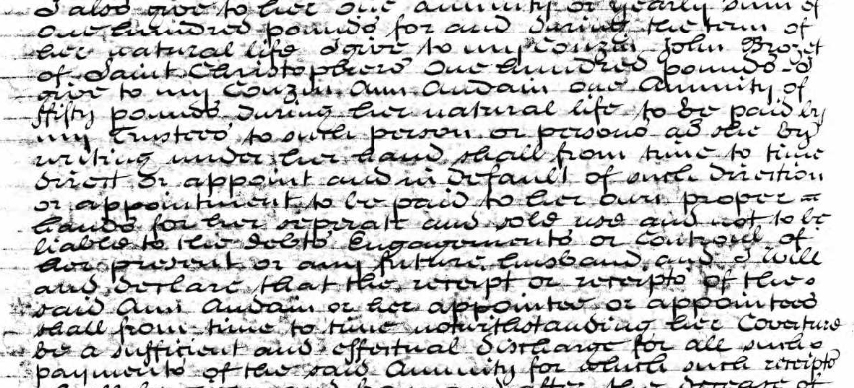
Will of Ralph Willett of Great Cansford, 1795
In 1792 Mary, eldest daughter and one of the heirs, of Sir Philip Monoux married Sir John Payne of Tempsford. The Payne family held extensive sugar plantations in Saint Kitts in the West Indies, all worked by slaves. Sir Gillies Payne, John’s father, settled in Roxton in 1750, where he fathered numerous children out of wedlock with Maria Keeling. Whether they eventually got married is the key issue which their descendents fought over in the Payne Baronetcy Case lasting from 1826 to about 1870! Sir Gillies purchased the Tempsford Estate, consisting of over a thousand acres, in 1768, paying £1,400 for it. Within five years he built Tempsford Hall.
On Sir Gillies’ death in 1801 the Bedfordshire and Saint Kitts estates were both inherited by John, Mary Monoux’s husband. His enjoyment of them was short, however, as he died in 1803 leaving two sons, Charles and Coventry. In 1812 Mary, on the death of the last of the Monoux baronets, inherited most of that family’s estates in Wootton, including Wootton House.
John and Mary’s son, Sir Charles, was a minor and was unfortunate in having a wicked uncle, Sir Peter Payne, as his trustee. Sugar prices fell dramatically and continued to do so after the emancipation of the slave workers in 1833. Graphic accounts were given of the poor condition of the Payne estate in Saint Kitts in 1803 [D197]. In 1792 Mrs Doyne-Ditmas's great-great grand parents Sir John Payne (c.1754-1803) married Mary Monoux ( 1766-1850 ). The Doyne-Ditmas Archive is part of a much larger body of documents relating to the Monoux, Payne and Monoux-Payne families. Some of the documents (F291-684 and AD2004-2703) were separated from the main archive after the sale of Wootton House and were purchased either by the County Record Office (Ref: AD), by Dr G.H. Fowler (Ref: F) or by R.Skinner of Bromham Hall (Ref: X53).
In 1792 Mary Monoux married Sir John Payne of Tempsford. From the Paynes comes the second major component of the Doyne-Ditmas Archives: the papers relating to St Kitts in the West Indies. A.O.Shaughnessy's thesis The Payne Estate of St Kitts and the Payne Family of Bedfordshire, January 1982, presents an excellent, detailed picture of this sugar planter family from its rise in the early eighteenth century to a peak during the ownership of Sir Gillies Payne (1720-1801). The thesis also chronicles the long decline throughout the nineteenth century, leading to its eventual sale in 1892.
Sir Gillies settled at Roxton in 1750, where he fathered numerous children by Maria Keeling. Whether they actually got married is the key issue that their descendants fought over in the Payne Baronetcy Case 1826-c.1870. Sir Gillies purchased the Tempsford estate in 1768. He paid œ1400 for the estate, which consisted of over a thousand acres. He had Tempsford Hall built within five years.
Sir Gillies's death in 1801 meant that the estates, both in Bedfordshire and St Kitts were inherited by his eldest son John, the husband of Mary Monoux. His enjoyment of the estate was short lived as he died in 1803, leaving a widow and two sons Charles and Coventry.
The Doyne-Ditmas Archive itself sheds considerable light on the Nineteenth Century ownership of Wootton and St Kitts by the (Monoux) Paynes. The estate was owned theoretically by Sir Charles. However he was a minor with an unscrupulous uncle, Sir Peter Payne as his trustee. Sugar prices fell dramatically and continued to do so after Emancipation of the Slaves (1833) and Peel's 1846 Budget. Graphic accounts are given of the poor condition of the estate in 1803,(D197).
-
Sir Gillies’ grandfather Abraham Payne was originally from Devon. He fought on the side of King Charles I during the English Civil War. He then left England and settled in St. Kitts. In 1726 Abraham's second son Charles was granted land in the part of St. Kitts which had formerly been held by the French. He was made a baronet on 31 October 1737. When he died in 1744, he was succeeded by Sir Gillies.
Sources
An Abstract from "The West India Sketch Book" by Trelawney Wentworth 1834
PARSON AUDAIN
" All the world's a stage, And all the men and women merely players : They have their exits and their entrances ; And one man in his time plays many parts." As You Like It. There appears to have been great spirit of emulation among the actors on the little theatre of Tortola. Whether he had been beaten out of the field by the monopoly of Messrs. Crabb and Isaacs, or whether it better suited his erratic and speculative turn of mind to exhibit his talents in a more enlarged sphere of action, certain it is that we arrived too late to witness the inimitable performances of one parson Audain. " This Mr. Audain," says Mr. Coleridge, " was a patriot : few of his cloth like him; he was not content with praying against the enemies of his country, he fought against them also. Saint Peter certainly owned a boat, and the authorised translation (Mr. Audain loved literal orthodoxy) intimates a partnership amongst some of the apostles in a ship. So Mr. Audain built a schooner, and carried on for many years a system of practical polemics with the disputants of the French school, to his own abundant profit and notoriety." We were only permitted to lend our ears to the recital of some portion of his history. He commenced his career in life as a midshipman in the navy ; but it is evident that he possessed a soul above the restraint which that office imposed upon him, and he gave up " watch and watch," and reefing topsails, for a province of action which might better suit his inclinations and his talents. As a midshipman, he might have remained till the present day, one of the multitude of that class of persons wearing his Majesty's livery, walking through a bare existence towards that promotion which defeats the purposes of hope, unless, per chance, he had obtained that passport to rank called interest; and he therefore wisely, we think, ex changed an existence for a living, by appearing on the theatre of life in the character of a parson. The West Indies, of all places in the world, presented an extensive field for the exercise of his sacred calling, but it proved too circumscribed for a mind that knew no bounds; and in order to fill up the hiatus between his occasional avocations in the church, he at length yielded to its craving solicitude after more active and profitable occupation, by embarking in the business of an auctioneer, and the more hazardous speculations attendant upon privateering. He was evidently endowed with the essential elements of a great mind, strengthened by a physical organization which capacitated him for deeds of daring, and which enabled him to acquire great self-possession, and that enviable habit of directing and concentrating his energies, to the immediate object which called for their operation. In the pulpit he was eloquent and persuasive, manifesting all the energy of a devout spirit, and a total abstraction from sublunary speculations. In his sale-room he was equally happy in engaging. the attention of his hearers, by descanting upon the beauties and utility of an article which no one else could detect, in a strain of winning hyperbole worthy of George Robins himself, until " they who came to hear, remained to buy." And in all the various details of his privateering exploits, he was no less distinguished for zeal, ability, and courage. To suppose, for a moment, that no occurrence of great and exciting interest could divert him from the particular pursuit in which he might be engaged ; that the current of his intentions was not to be turned out of its prescribed course by something which involved stupendous concern, would argue a pertinacity of purpose at the expense of his judgment ; besides, Audain was mortal, and he was not exempt from many of the frailties and weaknesses inherently co-existent with our finite nature. It will not therefore appear surprising, that he was once known to allow the powerful dictates of self interest, and the alluring prospects of patriotic enterprise to overcome, at a moment's notice, a proper regard to the duties which appertained to his more sacred calling. He was engaged in the pulpit when the report of a cannon was heard from seaward. From his station, as well as from other parts of the church, a clear view of the harbour was obtained, and a vessel shortly afterwards appeared in the offing crossing the entrance ; another report was presently heard, and the shot which was seen to throw up the water where it lodged in the direction of her course, gave evident token that it proceeded from another vessel that was in chase of her. It is scarce to be supposed, that the attention of the congregation was not more or less diverted from the purposes of devotion. Audain for awhile proceeded in his discourse, occasionally taking parenthetical glances at the vessel, until the appearance of a frigate under a crowd of sail, and nearly becalmed, left no doubt on his mind that she was in pursuit of an enemy. This was quite irresistible ; the prospect of a bit of worldly glory at once superseded for a time all other considerations : he dissolved the congregation by quitting the pulpit in haste, and proceeding to the beach, in a few minutes he was on board his privateer, and under weigh to join in the chase The use of his sweeps, and the aid of a light breeze which prevailed near the land, gave Audain great advantage in the pursuit over the frigate in a calm, and he presently disappeared behind the headland which forms one side of the harbour's mouth. Many persons ascended the heights to get a view of the anticipated fight, and the report of firing announced to those in the Road Town, whose speculations were upon tiptoe, that the conflict had begun. Audain was the first to board, and followed by his men, he was master of the prize before the frigate came within hail, and when she approached he was required to repair on board. He was not long in settling the point to his own satisfaction, that some individual at Dominica. hing on the score of courtesy, and respect to the national flag, was due from him, although not so ready to yield admission that the frigate had a right of participation in the prize, without having shared in the fight. Upon reaching the quarter-deck, he encountered in Captain B d, an old shipmate in the days of his nautical minority, and after mutual inquiries, congratulations, retrospections, and so forth, it was arranged that Audain should act as prize-master and prize-agent, to have the capture adjudicated in the Admiralty Court of Tortola. The frigate proceeded on her cruise, the prize was ultimately condemned and sold, and the proceeds, " errors and omissions excepted," were sufficient—to pay the expenses. An auction in the West Indies ! We must shut our eyes for a few minutes to enjoy a supplementary laugh within us, in bringing before us the visions of former days,—of the many-coloured and grotesque groups we have seen emulating each other in competition for a bargain, regardless of the injunctions of poor Richard, and bent only upon possessing some article of him who died yesterday, or of him who had come within the merciless grasp of the law. Unfortunately in all small communities no man is allowed to know half as much of his affairs as those who have no right to meddle with them, and in the West Indies they are mostly known to every body but himself : so much so, that he is often surprised at learning by a side wind that he wrote to England by the last packet for the purpose of supplanting another in an appointment ; that he is going to be married, or that he has had a sudden attack of fever, and that his virtues only became known to the community after his reported decease. An auction represents a benefit for gossips and an outlet for scandal. Every article will have its history from the date of its purchase, or first introduction into the colony, down to the lamentable occasion that is to transfer it to other hands ; and even the negroes, who love a sensation from whatever source it may spring, if they cannot share in the luxury of nodding at an auctioneer, and waiting the critical moment that is to declare them or their competitors the possessors of an article they covet, they are no less interested in the fiat of the arbitrator, or in the witty interpolations which usually garnish his discourse. The auction-room was in the vicinity of the burial-ground : Audain had mounted the rostrum, and was expatiating on the merits of each succeeding lot, now and then provoking a laugh from his auditors by a ludicrous suggestion, a double entendre, or quaint witticism, but invariably observing a dignified demeanour the moment he found his rhetoric had failed to induce another bidding, and that his hammer was to pronounce his decision. He had frequently looked at his watch as the sale proceeded, as if marking the progress of time towards another engagement ; and as it drew to a close, it was evident, by the rapidity of his movements and the urgency of his demeanour, that he wished it terminated. This was more apparent from the frequency of his directing his attention through a window to some object outside, until at length arriving at the last lot, he gave solemn assurance that he could not " dwell ;" and having pronounced those prophetic words, " going, going, going," still having his eye askance toward the window, the sound of the hammer seemed to give impetus to his movements, and to declare him gone, for he disappeared in a moment. The object which had engaged his attention was a passing funeral, and it suddenly brought to his recollection that he had been required to perform the ceremony of burial himself. Mortified at being supplanted in his professional vocation, it was with difficulty he could suppress the workings of his inward man, and his eye followed, and his proceedings kept pace with the procession till it reached the grave ; and as the hammer gave emphatic decision to the contest for the last lot, the crowd had assembled round the appointed receptacle for the remains of the deceased. Hither Audain proceeded, and he reached the spot just as his rival commenced the service and uttered the words, " I am the resurrection "—" Stand aside," said Adain, " I am the resurrection !" and he proceeded with the ceremony, with the utmost composure whilst the assembled crowd gaped wild astonishment, and his discomfited competitor remained as effectually paralysed as if the Falls of Niagara had that moment lodged on his devoted head. The recital of this transaction does not redound much to the credit of Audain, or the society in which he moved; and however we may be disposed to smile at the ludicrous associations it brings before us, we cannot refrain from repro bating such a profanation of decency. We must however, make allowance for the distorted medium through which the recital of it reached us, bearing in mind that whatever militates against the character of individuals, especially if placed in a field of competition within the circumscribed limits of a small community, invariably assumes an aggravated aspect, as it becomes a subject of frequent comment or animadversion ; " For slander lives upon succession ; For ever hous'd where it once gets possession." If there was not less profanation in the union of his clerical and military functions, he had at least the influence of example to plead in extenuation, or to serve as an anodyne to his conscience ; an instance of which, as related by Du Tertre, took ' place during a conflict between the French and the English at Saint Christopher in 1666. Father Boulogne, having put off the dress of his order, and habited himself as a cavalier, proceeded upon horseback to the head of the battalion, animating the soldiers to fight courageously, assuring them that their cause was one of religion as well as state, because their enemies, the English, were heretics, and the palm of martyrdom would be given to those who fell in the battle. He then made them all kneel down, beg pardon for their sins, and gave them absolution. After the action was over, he again changed his dress, and as a friar administered the sacrament to the dying Audain, however, had higher authority, by which to justify himself. The Archbishop of Bourdeaux, a favorite sea-officer of Louis XIII. commanded the French fleet which defeated the Spaniards under Don Lopez de Hoyez, in 1638 ; and the exploits of another martial prelate, Don Antonio d' Acugna, Bishop of Zamora, are recorded by Guevarra, in his notice of the revolt excited by Juan de Padilla and others at Castile in 1520. But the star of Audain, which had culminated in the meridian of Tortola, began to wax dim. " An acquaintance of mine," observes Mr. Coleridge, " met him one day in the streets of Basseterre, in Saint Kitts, surrounded by negroes, to whom he was distributing plantains, yams, potatoes, and other eatables, and holding private talk with them all by turns. Having caught my friend's eye, he came up to him and said, ' I'm going to smuggle all these rascals this evening, to Guadaloupe.' He did so in his schooner, but remained himself on shore. A privateer of Nevis captured the smuggler before she could get to her market. Audain became furious, went himself to Nevis, and challenged the owner of the privateer to fight. The challenge was not accepted, and Audain immediately posted the name of the recusant as that of a scoundrel, on the wall of the Court-house. He himself for two days kept watch upon the plat form with a sword by his side, and four pistols stuck in his belt, to see if any one dared to touch the shields. " He fitted out another schooner, and cruized in her himself. But fate was too heavy for him, though he struggled against it like a man. On the second day a large vessel was seen to leeward ; he ascertained her to be a Spanish trader, and, supposing her to be wholly unarmed, bore down on her as upon a certain prey. When he came within pistol shot, fourteen masked ports were opened, and as many guns pointed at him through them. Audain was obliged to strike in an instant, and with his carpenter, succeeded in secreting himself under some water-casks in the hold of his schooner. The Spaniards came on board, and cut every man in pieces, except Audain and the carpenter. These two lay all night under the casks, but in the morning, upon further search, their asylum was discovered. They were brought upon deck, and the Spaniards were upon the point of hewing them by inches, when their Captain exclaimed with rapidity, ' Hold all ! this man's life is sacred, and the other's too for his sake.'—Audain had formerly done the Spaniard great service at Saint Thomas's, and it now saved his own and his carpenter's life." At a subsequent period we find him living at St. Domingo, as a trader. He here managed to quarrel with two black general officers, whom he challenged, and shot them both severely. Christophe sent for him, and told him that if either of them died, he would hang him on the tamarind before his own door. So Audain, who had little hopes of their recovery, thought it advisable to attempt to secure his life by escape, which he effected by night in an open boat. He had fought thirteen duels, and was a good boxer.—" Once upon a time," says Mr. Coleridge, " he fired twice without hitting ; upon which he threw the pistol on the ground, and said sternly to his second, 'Take care that does not happen again !' supposing his pistol had not been charged with ball. A delay occurred in re-loading for a third time, upon which Audain went up to his antagonist, squared his body, and saying, ' some thing between, something between, good Sir !' — knocked him down with a flush hit on the nose."
1 " This was like the Cornish Vicar," observes Mr. Coleridge, in alluding to a similar transaction which occurred with the same" He was preaching one afternoon in a sea-side church during a heavy south-west gale, when all on a sudden his audience began to move, take down their hats and press towards the door. The Vicar, having the advantage of pulpit eminence and long experience, immediately perceived the cause, and animated with a just indignation at their conduct, ordered them, as they valued their souls' welfare, to remain quiet till the end of the sermon. The good man, in his eagerness to restrain them, even left the pulpit, and, like Aaron, ran into the midst of the congregation, rebuking them and exhorting them, till he reached the porch ; when, tucking up his gown under his arm, he shouted out, * Now, my boys, let us start fair !'.—and immediately scampered off, with his flock at his heels, to administer Cornish relief to a distressed merchantman."
